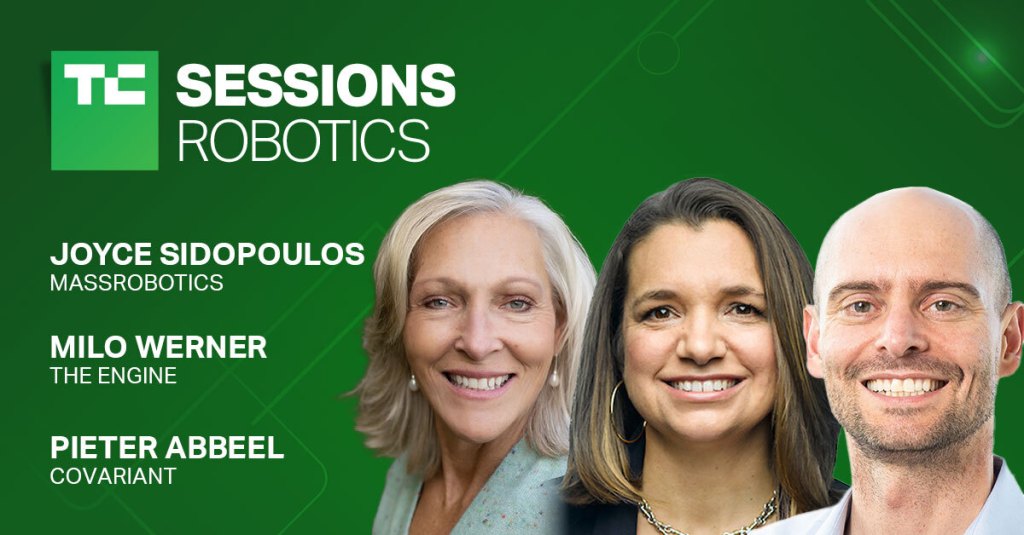It’s a long road taking an idea from the R&D stage in a lab to successful commercialization, especially when you’re talking about technologies as complex and costly as robotics and artificial intelligence.
Robotics startups require expensive equipment — like industrial-grade sensors, 3D printers and controlled environments — for building and testing prototypes. And even though robotics is weathering the current slowdown in venture funding better than other tech sectors, it’s still too easy for innovative inventions to remain stuck in the lab.
That’s why we’re thrilled to welcome three experts in the process to TC Sessions: Robotics on July 21: Pieter Abbeel, co-founder and chief scientist at Covariant; Joyce Sidopoulos, co-founder and VP of programs and community at MassRobotics; and Milo Werner, general partner at The Engine.
In a session entitled “From Cage to Stage: Commercializing AI and Robotics,” the panel will share their considerable experience in what it takes to move a robot or AI process from the lab to market.
Here’s what our panelists bring to the table, and why we can’t wait to get their take on the topic.
In addition to founding Covariant, which develops AI for robotic automation of warehouses and factories, Pieter Abbeel is the director of the Berkeley Robot Learning Lab and co-director of the Berkeley Artificial Intelligence (BAIR) Lab.
A founding partner at AIX Ventures, a VC firm focused on AI startups, Abbeel also hosts The Robot Brains podcast, which explores what AI and robotics can do today and where they are headed.
Abbeel’s work has been featured in the New York Times, Wall Street Journal, BBC, Rolling Stone, Wired, Tech Review and (of course) TechCrunch.
As the co-founder and vice president for programs and community at MassRobotics — whose mission is to enable and grow the next generation of robotics companies — Joyce Sidopoulos develops high-impact programs for the robotics ecosystem. She matches startups with potential funders and customers, connects students and talent to potential employers and works with academia to commercialize research.
Previously, Sidopoulos served as the innovation and robotics community manager for the Massachusetts Technology Leadership Council to expand the robotics ecosystem in Massachusetts and the New England region, which helped lead to the founding of MassRobotics.
Sidopoulos spent 14 years with the USN’s Naval Undersea Warfare Center, where she served in various roles, including chief scientist, systems and test engineer and sonar systems analyst/engineer. She has held senior roles at General Dynamics and other defense contractors.
Milo Werner is a general partner at The Engine, a VC firm that helps deep tech companies bridge the gap between discovery and commercialization. Previously, she was a partner at Ajax Strategies where she led midstage investments across energy, transportation, agriculture and industrial applications.
At Tesla, Werner led the new product introduction team and helped launch the Model S powertrain and Model X. She also ran the new product introduction team at Fitbit, and she led engineering and product development at Zola, a microgrid startup providing distributed energy to families in Sub-Saharan Africa.
Werner earned a BS in Geology and Civil and Environmental Engineering from the University of Vermont, an MS in Civil Engineering and an MBA from the Massachusetts Institute of Technology.
TC Sessions: Robotics is a free online event, happening July 21. You can catch all of the sessions and join the robotics community online for speed networking, chats and one-on-one meetings. Simply register here for free.































Comment